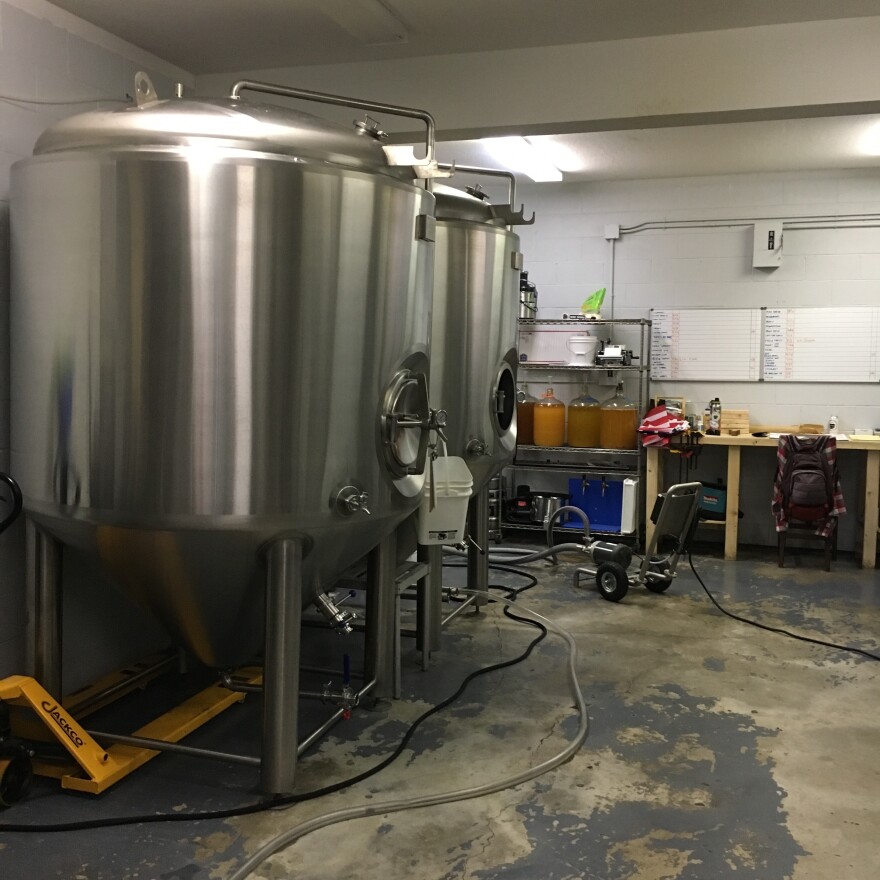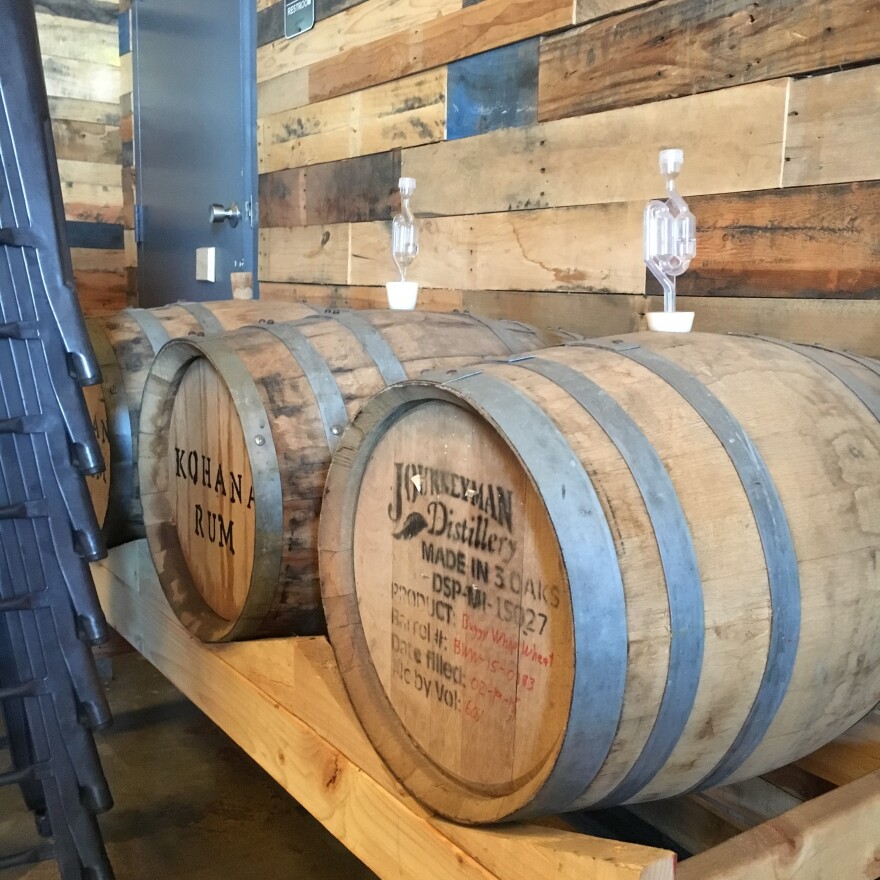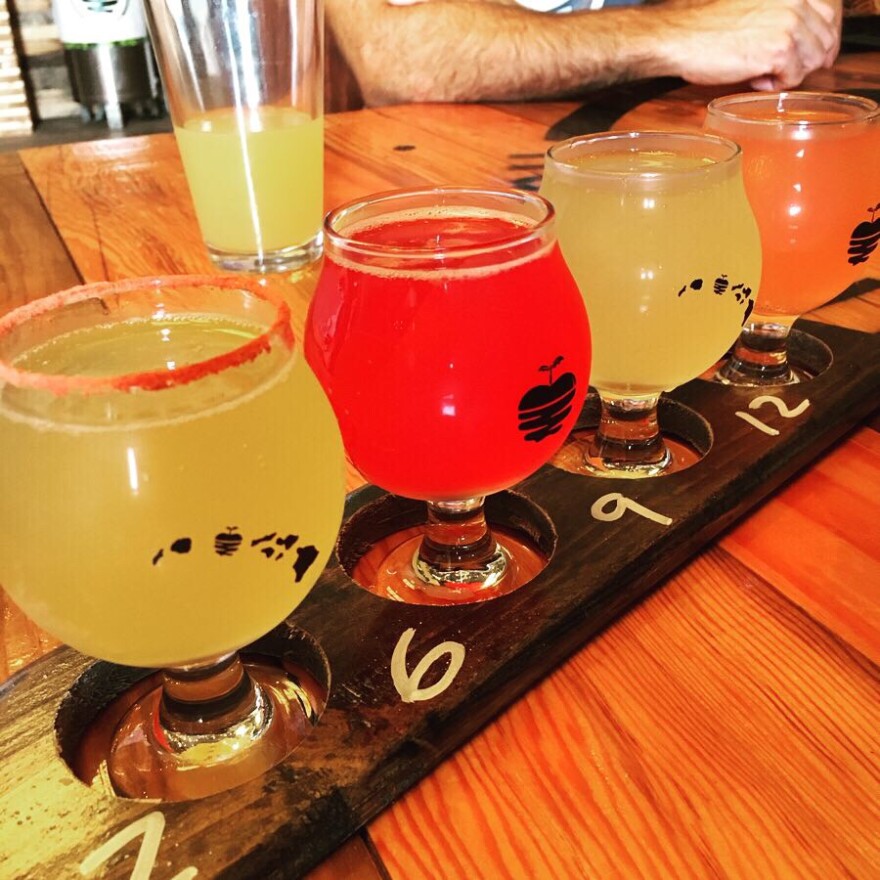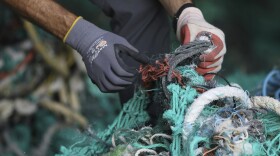Opening a business can be hard in Hawai?i. But one operation is finding early success highlighting local fruits in hard cider, an alcoholic beverage made from fermented apple juice that's caught the attention of millennials and other consumers.
Shaun Peck and Kasey Sulheim founded Paradise Ciders in 2017 with the hope of filling a gap in local craft beverages with their hard cider varieties.
Hard cider is following on the popularity of craft beer that first gained attention about 20 years ago in cities like Portland, Oregon and Denver. It's only been in recent years that craft breweries have opened successfully in Hawai?i, and now Paradise Ciders is putting a local spin on hard cider by highlighting fruits found and grown in the islands.
How It All Started
Peck started experimenting with home brewing in his teens. And like most home brewers, he started by making beer. At the time, he was making dark or heavy beers. "It's just not very enjoyable when you're in this hot climate that we live in here," he said.
So he started looking for something that was a little more refreshing and enjoyable.
"I actually started trying ciders because, growing up, I'd always had the (non-alcoholic) Martinelli's during Thanksgiving or special occasions. So I started trying alcoholic ciders. I liked the idea, but everything was just way too sweet," Peck said. "There was just too much sugar added to the products, and it was leaving this film on my teeth. Or you could maybe have two or three of them, but then you would kind of start feeling sick."

Peck started looking for other ciders on the market. He found a wide spectrum ranging from the super sweet to the super dry, like champagne. But none of them quenched his thirst. "So I decided to try and make it myself," he said.
He would spend his weekends brewing ciders in his garage, and giving it away to friends. He met Sulheim while working as a bartender at the Yard House in Waik?k?. At the time, Sulheim was also looking for a refreshing beverage.
"We had a lot of similar interests, and just became friends at Yard House," Sulheim said. "Then he started talking about this cider, and it was like 'Alright, I gotta try it.' So went over there (Peck's house), and he actually let me help him brew a batch."
It didn't take long before the two began making cider together in Peck's garage. But then a hit-and-run changed everything. Peck was side-swiped on his motorcycle riding on the freeway, and broke his hip.
"It put me out, couldn't walk for about five months," said Peck. "The cool thing about that was it gave me a lot of time to, I mean, not only ponder about life, but where the direction of where I'm going in my life. And then it also gave me a lot of free time to be looking on Craigslist for locations."
Starting Up
He and Sulheim were immediately sold on their leased space in Kalihi. It already had a commercial kitchen, and the rest of the building was occupied by a fruit packaging company. Peck says it was a match made it heaven. But before they could start making cider, they needed to get legal.
"I didn't know much about the fermenting side of things, I was still learning as we were home brewing," Sulheim says. "But he (Peck) didn't know anything about the liquor licensing. So that's kind of how I brought my value to the table. I was going to get us legal, and everything on that end all squared away."

It was a time-consuming task.
"Between working two jobs, also sitting on the phone with the TTB (federal Tax and Trade Bureau), and running around to all these permitting departments...It was exciting though because every once and awhile you'd get some success."
Like many breweries, Paradise Ciders found itself paying rent even before it made a dollar. Bart Watson, chief economist of the national Brewers Association, says small startup breweries and cideries face several challenges.
"The first is that it's a capital intensive business, and raising that much money basically for a startup is a challenge for any business," Watson said. "Secondly, they're small businesses. And any small business is difficult from financing to staffing to all the other challenges a small business would face."
Finding Success
Nine months after signing their lease, Peck and Sulheim were legal, and making cider. It didn't take long for things to start falling into place. During one of their permit hearings, they met the owners of Grace in Growlers in Kailua, which became their first customer. Peck and Sulheim were then able to get their cider on tap in places like REAL, a gastropub, Village Bottle Shop & Tasting Room, and the Merriman's chain of restaurants.

When they first started out, they only had one flavor, the Lei'd Back Lilikoi. Slowly, word spread to other bars and restaurants about their lilikoi cider. It wasn't long after their clients started asking for more flavors.
"When we hit the market with that one flavor, we were like 'Alright, cool! This is our flavor. We're going to be like Budweiser, we got one flavor. We just do that, and we're good,'" said Peck.
"About a month in, maybe two months in, everyone was like, 'So...what's the next flavor? What else you got?' And we were like, 'Wait, we have to do different stuff, too? Oh, shoot!' So we started making a couple other flavors."
That's when they unveiled the first of their Kickit series -- a cider with a mixture of ginger, lemon and pineapple. Shortly after that, they released their Mango Daze and Guava Lava varieties.
"I think the gluten-free thing really pushed cider into the market really hard. But I think it's also the refreshing side of it. A majority of people are wanting something that's easy to drink, but gives them a nice buzz and is kind of crafty too." - Shaun Peck
The fruits they use in their ciders are mostly grown locally. And they have even made small cider batches using the fruits people bring into their shop.
But for a small business, success brings different kinds of challenges -- specifically, keeping up with demand.
"You only have so much tank space to ferment your stuff in," says Sulheim. "Our bread and butter is distribution to other bars and restaurants. A lot of restaurants do rotating handles, but then places like the hotels, who have to reprint their menus, you only got flavor there. So you have a tank dedicated just for that account."

Paradise Ciders has six main varieties that can be found in O?ahu bars and restaurants, and a couple of places in Maui. Their smaller batch or seasonal ciders can be found in their Tasting Room in Kalihi.
Peck and Sulheim are planning to add more fermentation tanks. Eventually, they would like to bottle and can their creations for retail sale -- and defy the odds of survival for new local businesses.
More information about Paradise Ciders, their varieties, and the location of their Tasting Room can be found at www.paradiseciders.com/




